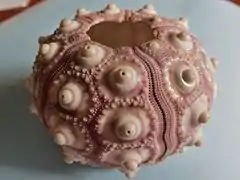Phyllacanthus imperialis
Phyllacanthus imperialis, also known as the Sputnik urchin, imperial lance urchin, imperial sea urchin, imperial urchin, pencil sea urchin, lance urchin, knobby sputnik sea urchin, mine urchin, and land mine sea urchin, is a species of sea urchins in the family Cidaridae.[2]

Test (shell)
| Phyllacanthus imperialis | |
|---|---|
 | |
| Scientific classification | |
| Domain: | Eukaryota |
| Kingdom: | Animalia |
| Phylum: | Echinodermata |
| Class: | Echinoidea |
| Order: | Cidaroida |
| Family: | Cidaridae |
| Genus: | Phyllacanthus |
| Species: | P. imperialis |
| Binomial name | |
| Phyllacanthus imperialis | |
| Synonyms | |
| |
It has distinctive thick, blunt spikes. The test is brown or black. The spikes vary in color. This species emerges at night to eat invertebrates and sponges.[3] During the day, it tends to remain hidden in holes in the coral reef. Phyllacanthus imperialis is found throughout the Indo-Pacific region.[4]
References
- "Phyllacanthus imperialis". clarenbach.org.
- "WoRMS - World Register of Marine Species - Phyllacanthus imperialis (Lamarck, 1816)". marinespecies.org.
- "NaturaLista · Imperial Lance Urchin (Phyllacanthus imperialis)". NaturaLista.
- "Imperial Sea Urchin". Project Noah.
This article is issued from Wikipedia. The text is licensed under Creative Commons - Attribution - Sharealike. Additional terms may apply for the media files.